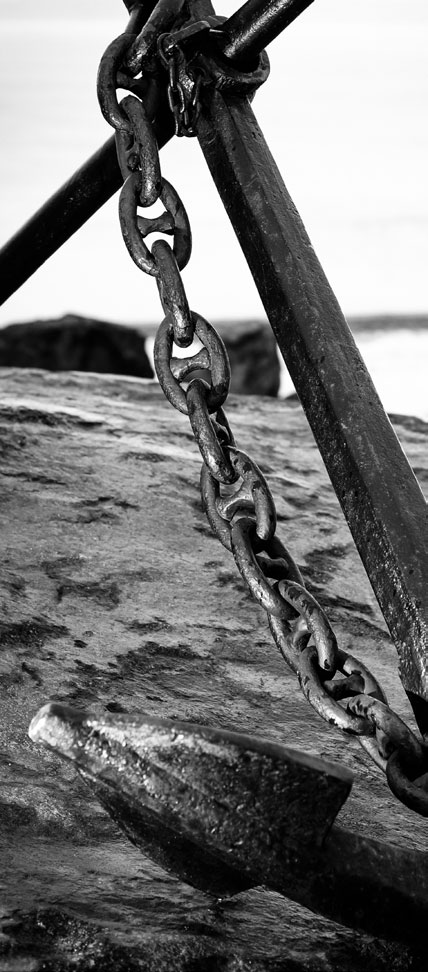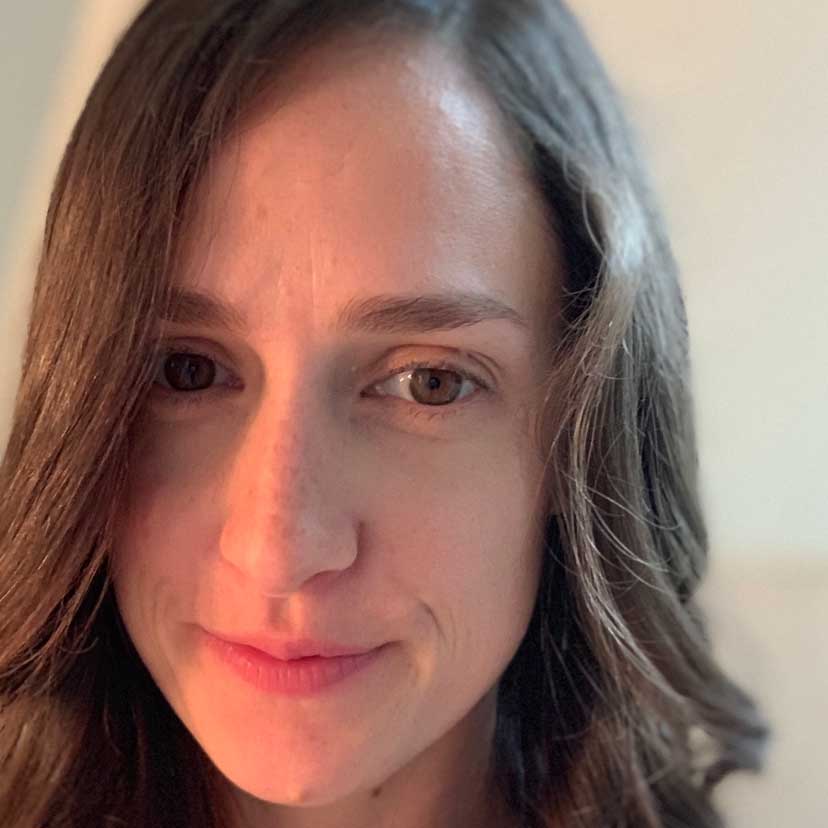Anchors Up
– Fiction by Gwynyth Kier –
Featured in issue 15 of Dreamers Magazine

I’ve been running my whole life. My earliest memory: dashing barefoot through our field of wild unkempt grass, mile high dandelion stems brushing my naked thighs while my mother chases me waving a yellow dress with white polka dots over her head. She said I’d be taken in by a pack of wolves if I wasn’t careful. Said I’d be scratched by thorns, bitten by ticks, grooved and pocked like the oak by the pond. It all sounded perfectly wonderful to me.
I could run and keep on going until I fell on my face, breathing hot satisfied exhaustion into the earth. I could run and run and run until I had to dunk my whole head into the dugout, and hope my skin would drink the water by itself, I’d be too spent to lick a drop.
The boys at school stopped racing at recess when I started running alongside them, then in front of them, my thin canvas sneakers shrouded in clouds of gravel dust.
My granddad said, “Put those spindly things to use! Get her signed up somewhere to win some medals.” Said I was his silver bullet, a clean shot through the heart.
Mum kept laying out dresses of all manner, blue corduroy, red gingham, a turquoise number with little pink stars. She tried a denim jumper. I ran from them all.
…
I felt only moderately sorry when Mum threw up her arms in the kitchen after I’d let her pie burn.
“Laila! You’re sixteen years old, you can watch a pie!”
But I couldn’t. I’d told her. I was busy with the charcoal Granddad had brought me back from the city. I was running a sooty line across the thick manilla paper that had appeared with the gift, parcelled and tied with brown string and left wordless on my bed.
I was pushing my fingers against that line, blurring its edges. I was making something appear and change and getting my hands covered in it. I couldn’t watch a pie.
When Granddad died the next year and the service was over, the house full of obligatory casserole and squares of sticky confection, I didn’t feel anything but the rush of wind in my ears and momentum pushing my body forward. I couldn’t feel for my mother as I packed up the nubs that were left from that charcoal set and the stack of cash Granddad had pressed into my palm a few weeks before, and told her I was making my way. I don’t think she could feel much of anything either. Except maybe a breeze of relief.
I spent the next few years running for buses, for the ding of the kitchen bell to deliver eggs to hungover kids. I ran for cancer one weekend, lupus another. I ran into trouble parked on street corners sketching portraits for tourists — one needs to pay for such privilege. Eventually I ran into you.
When you sat for a sketch you asked for a barter; a drink on you around the corner. It smacked of the smarmy hey baby’s I’d usually refuse, but you looked like you’d spent all week getting up the muster to ask a girl to the dance. In the portrait I transformed those bright eager eyes making them sure and smoky, a real Marlborough Man, and let you escort me to a patio beside the wharf.
The water was calm. A warm wind wrapped our table in soft salty air. You told me the sailing this summer was a dream, It was merrily merrily and did I have legs for the sea?
Our first trip out you navigated the Shirley Temple, a tiny little thing with a rusty orange sail. I sat at the bow chin to knees, hugging my legs together and staring out at the sea. The cool wet air rushed at my cheeks and seeped into my bones. That afternoon, as a tiny speck on the ocean I felt cleared out. I felt made new.
“I could bob along right here forever,” I told you.
“A mermaid. I knew it right off when I saw you,” you said.
We ran together then at every opportunity to the sea, with whatever vessel you could procure. There seemed to be no end to your nautical connections.
You told me you’d spent a few summers working at the marina. Maintenance and valet for the yacht club. Said you’d been well liked, a good kid. Said folks were happy to pay you a favour. We went in dinghies, sailboats and when nothing else was available, we snuggled close at the rail amidst the weekend masses on the passenger ferry.
We unmoored a yacht once. This was slipped out of its sleek line of neighbours under the stars, and the easy attitude you always had at the helm was strained.
“We can’t go into the rooms.” You said. “These owners are pretty private.”
“I’m just going to use the bathroom. Promise.” I said climbing down the tiny wainscotted staircase into the underbelly of the boat. But I found I couldn’t quite temper my curiosity. I opened a door just a crack. The tiny room fit a small bed wrapped tightly with navy sheets, a fuzzy cream throw draped perfectly askew across it. A few photos sat in frames along a picture rail, and I wondered for a moment how they managed to stay up.
A charming couple with flutes of bubbly raised to the camera, smiled out at me with perfect white toothed joy. Beside them a little boy stood at the helm, a cautious smile on his little bow lips, a swath of golden cherubic hair wisping starboard in the breeze. His eyes were earnest and I recognized them immediately. They were the ones left out of your portrait a few months before.
“That’s the tiniest most luxurious bathroom I’ve ever seen!” I said rubbing my hands with the lavender lotion that was tacked above the sink in the loo.
“Ridiculous, I know.”
I wanted to ask you about your mother-somehow we’d flitted over this formality. I wanted to ask where you were hiding those fresh happy faces. I almost did. I thought we’d have a laugh and maybe find a mini bottle of that effervescent happiness in the bar fridge. Then I thought of my own mum, hanging out dulled long skirts on the laundry line, dust on her boots. I thought of the sparse chilled house she’d walk back into, her tarnished pot of earl grey for company.
Instead I stood beside you and we let the lilt of the water quietly rock us.
For nine months we lay at night on your futon side by side, while you told me stories of the adventures we’d have. Sailing the Georgia Straight, the Panama Canal, the Mediterranean Coast. We’d kiss the land, quick and cheeky, moving on before terrestrial roots could grab hold.
In the meantime we’d settle for jobs and bargains, scraping deliciously by on spaghetti dinners, suspended in a montage of first love.
…
I ordered the clam chowder even though this is the first ferry of the day. The gift shops on board still have barred partitions across their doorways, but the chowder is hot and up for offer.
I’ve only managed a spoonful. I’ve never understood the cult appeal of the ferry chowder. It looks like white school glue coating chunks of kindergarten craft detritus. I’m only having it now to keep my promise that I’d try it one day. “Next time.” I’d always assure you as we followed the herd over clunking metal ramps onto land. “Next time for sure.”
A second spoonful doesn’t quite push down the guilt that’s slowly rising as I picture you across from me, expectant of a convert.
…
It wasn’t as if I’d planned to go. I didn’t get up this morning, smooth my ponytail, tuck in my shirt and rehearse farewells in your toothpaste splattered mirror. I didn’t pause to examine the sudden impulse to shove my sketchpad and an extra outfit into my backpack and collect my scattered bangles from the bedside table, shoving them up my arms like warrior bands. I just moved about the apartment while you snored, splayed on the bed, as if executing the steps of a well rehearsed dance. I slipped on the green army jacket you bought me at the flea, laced up my boots and walked over to the bed. I pet the thick blonde wave of your hair with my palm like you were my cat and you didn’t stir until I leaned a whisper into your ear, “We’ll be late.”
You sprung up then, not unlike a kitten, and pulled me toward you by the waist, nuzzling my stomach and murmuring alternative plans for the day. All the while, the truth lay buried deep enough to make me believe I was still there in your apartment wishful for a day off.
I persuaded you to go through the motions: wash, dress and head down the stairs with me to the bikes. You held my hand the whole three flights down.
We rode as we always did, side by side down the near empty streets of dawn, stopping outside the bakery, where the dreamy alchemy of butter and flour would wrap itself around you for the day.
Leaning over handle bars we kissed good-bye.
…
There’s a family in a cluster of chairs just outside the cafeteria. The dad is lying back, eyes closed, with a length of child draped on top of him sleeping. The mom is watching with vacant eyes as their little boy bounces a rubber ball and scrambles after it on the floor. She reminds me of that palm reader-you remember, at the flea? She stared out seemingly into the netherworld, and told you the tide was going out. You laughed at her hokey premonitions, but I never told you she was looking over your shoulder, straight at me
About the Author – Gwynyth Kier

Gwynyth Kier is an emerging writer, exploring the multifaceted world of women and motherhood, while raising her own wild brood in Toronto. When she isn’t writing she’s either reading, dreaming up her next travel adventure, or trying to persuade her family that it’s a great day for a hike.
Did you like this story by Gwynyth Kier? Then you might also like:
Someone to Watch My Back
Pieces of You
Prepared
Delete.
To check out all the fiction available on Dreamers, visit our fiction section.
Like reading print publications? Consider subscribing to the Dreamers Magazine!